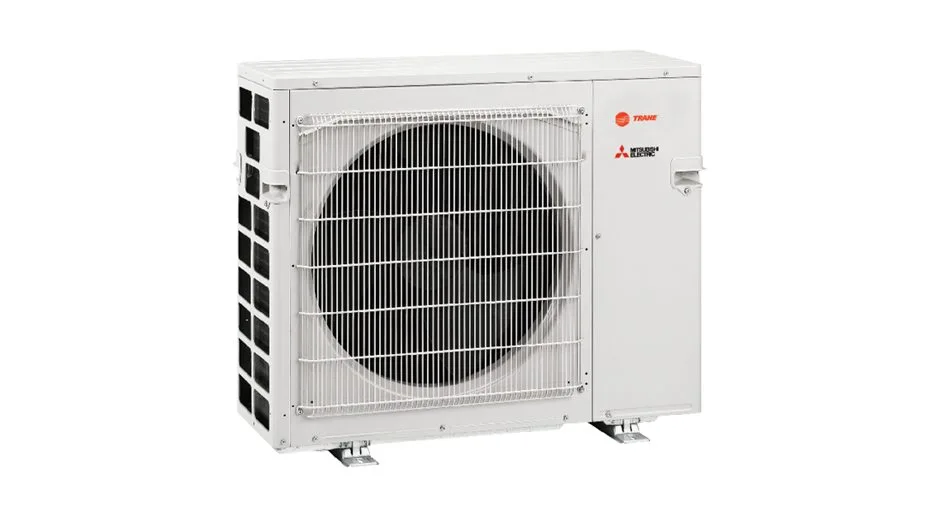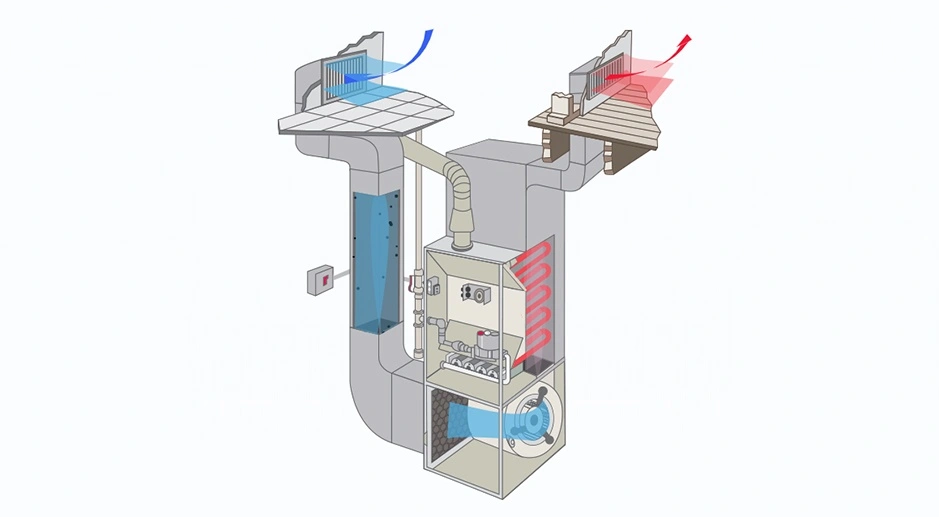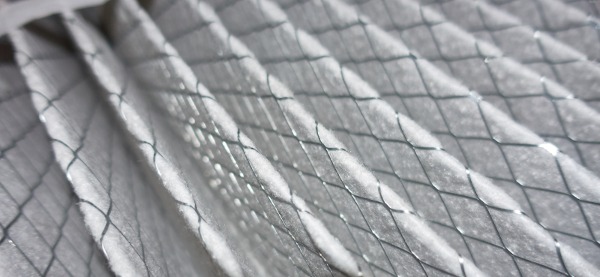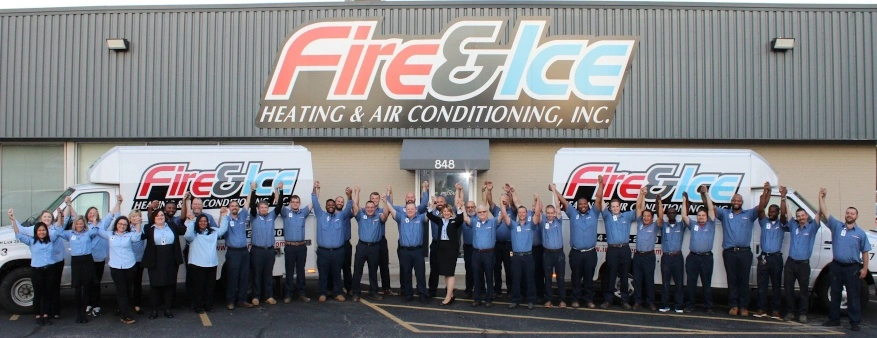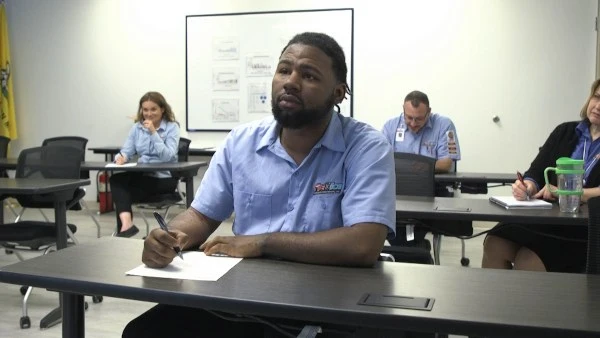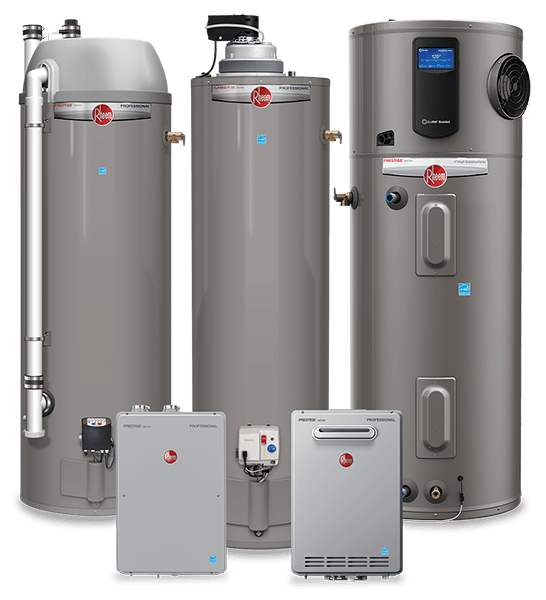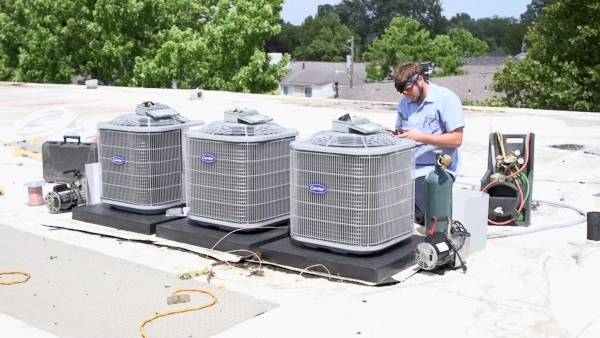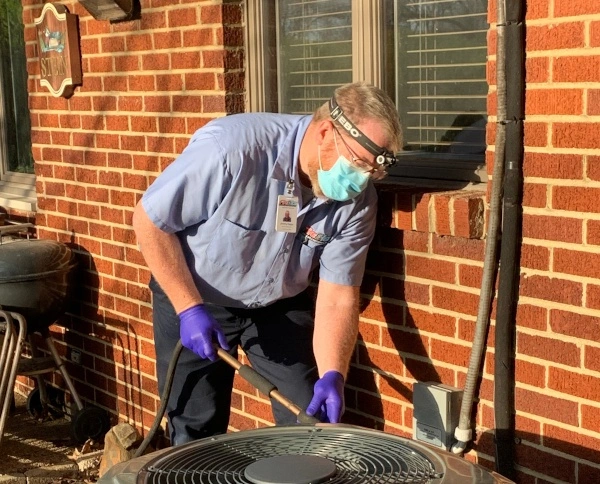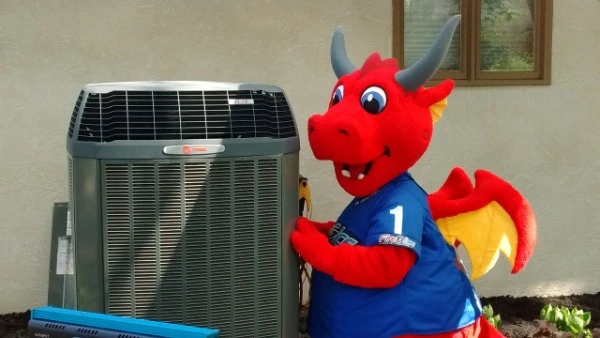


Author:
Revised:
February 10th, 2020
Can a heat pump replace my AC and furnace?
It depends.
You’ll hear that answer a lot if you spend time with an HVAC salesperson. Yes, you can do certain things IF certain other things are in place, and IF you weigh the positives and negatives, and IF you understand the consequences.
So if the question is whether a heat pump can replace both a furnace and an air conditioner, the answer is, “Yes, but…” There are several factors to consider.
The first step is to explain how heat pumps and furnaces differ. Then we’ll need to go over the differences between a heat pump and an air conditioner. Air handlers are also a part of the conversation, as well as cost and comfort.
After all, your HVAC equipment should work with a minimum of hassle. If installed and used correctly, it should give you years of worry-free service.
So let’s begin by breaking the big question into two major parts: Can a heat pump replace a furnace, and can a heat pump replace an air conditioner?

Heat Pumps vs. Furnaces
Let's consider a gas stove. Light one of the burners and hold your hand above the flame. Depending on how close your hand is, it will get very hot. Now shut the stove off and walk over to the refrigerator. If the fridge is running, you should feel the heat coming from behind or underneath. It may not be hot, but you should be able to feel the warm air.
Of course, the stove is very hot because you are burning fuel. But how does the refrigerator produce warm air when it's not burning any fuel? It's keeping your food cold by squeezing the heat out of the air inside the fridge and transferring the heat to the room.
In a basic way, this is the difference between a furnace and a heat pump.
How Does a Heat Pump Work?
What a heat pump is doing is transferring heat from one location to another. During the heating season, it squeezes the heat out of the outside air and transfers it to the inside of your home.
The unit has a reversing valve that allows it to work as an air conditioner during the summer. It squeezes the heat out of your house and transfers it outside.
Can Heat Pumps Work if the Outside Air is Cold?
Even when it feels cold, there is still heat in the outside air. But heat pumps are less efficient as the outside temperature drops. It's why they are a much more common heating source in places where winters are moderate. As the technology has improved, heat pumps have become more viable for places such as Central Ohio, but on the very coldest days, a heat pump will have a difficult time keeping your Columbus home comfortable.
When the temperature drops into the 20s and below, the heat pump will do the work for as long as it possibly can. Once the controller indicates that the heat pump needs to defrost - because it will freeze up if it gets too cold - it will need backup from an alternative heat source.
Part of that solution could be an air handler equipped with heat strips.
Air Handlers Need to Be a Part of Any HVAC System
An air handler is a part of any ducted HVAC system. Simply put, it is what moves the air throughout the system and your home.
Air handlers are indoor units that pair with an outdoor condenser to deliver conditioned air into buildings. These units contain an evaporator coil and a blower that moves air over the coil to distribute conditioned air.
Air handler blowers can come in anything from single-speed to variable-speed. A single-speed blower has two positions: It’s either working at 100% or off. If you happened to pair this with a heat pump that has variable speed, you’ll have just one speed.
If you want a variable-speed heat pump, you’ll need a variable-speed blower in your air handler to get the full functionality of both units.
Heat strips inside your air handler (they can be installed, or some handlers already have them) are sometimes referred to as “emergency heat” or “backup” heat. The heat strips work much like a toaster oven. The conducting metal gets red hot. The blower then moves that heat through the ducts.
When the temperature drops too far, the heat pump’s coils can frost over. If there’s still a call for heat, the emergency heat can kick on, which allows the heat pump time to defrost.
Types of Furnaces
Gas Furnaces
Probably the most common and cost-efficient due to the low cost of natural gas, gas furnaces need to have a gas line run into the home to fuel the system. Gas companies will generally run a gas line only to the meter outside your home. An HVAC contractor then has to run the gas line from the meter to your furnace. Depending on the distance between the two, this can be a significant job in terms of both time and money.
Less common are propane and oil furnaces. The sheer cost of propane and oil make these a rarity. Compared to gas, the monthly fuel expense is high, but they can heat your home well.
Electric Furnaces
Electric furnaces are the main alternative to gas-based systems. They use electric power to generate heat. In instances where a lack of accessibility to a gas line is an issue, they can be a viable option.

Which Is Better: Heat Pump or Furnace?
Which is the right choice for you, heat pump or furnace? Here are some factors to consider. If you don't have access to natural gas, heat pumps are the most efficient form of electrical heat for your Columbus, OH, home.
There's also a matter of personal preference and comfort. Heat pumps and furnaces are both forced-air systems. A furnace heats the air to a much higher temperature, so the air moving around the house will feel warmer. The heated air from a heat pump is generally lower than your body temperature. Even though it's heating your home, it may feel cool on the skin.
It is much more expensive to use emergency heat than it is to run the heat pump. You don’t want to use your oven to heat your home. Ditto for the emergency heat; it takes a lot of energy to get and keep the strip hot.
Heat strips are a terribly inefficient way of heating your home, especially compared to a gas furnace. The electricity bills will skyrocket. If the temperature stays below 20 for an extended period of time, the heat pump will provide little heat, if any. So you’ll be stuck with strips trying to heat your entire home.
A portable heater or two might be in order in strategic rooms. Or you can install ductless mini-splits.
Ductless Mini-Splits Can Help Heat
If you go with a heat pump exclusively, mini-split heat pumps can provide additional heat to individual rooms. Homeowners can have these systems installed, and can run up to five heads, which can heat multiple rooms at the same time. These can be zoned, as well. One room’s temperature doesn’t have to be the same as another, giving you a level of control over different rooms.
For a small home, these can be ideal. For larger homes, especially those with a large number of rooms, mini-splits can heat only a small portion.
This is not a cheap option. Mini-splits are efficient, yes, but at a price.
Below we've listed typical costs. All costs listed include labor and fees.
- A single zone/one room heating and cooling solution will range between $3700 and $6000.
- A dual-zone/two-room system will run between $5,500 and $9,000.
- A system that provides heating and cooling for multiple zones/three to eight rooms starts at $8,500 and up.
Total Cost of a New Heat Pump
Now that you understand the factors that affect the cost of your heat pump, what does the cost come to?
Heat Pump Equipment & Installation Costs:
Entry-level heat pump: $4,900 - $7,000
Mid-range heat pump: $5,500 - $10,000
High-end heat pump: $6,500 - $12,500
The biggest factor that separates those tiers is whether the heat pump is single-stage, two-stage, or variable-capacity. The size of the pump, measured by how much air it can move, is also a large factor in the price.
2 Reasons Not to Replace Your Furnace
- If you already own a gas furnace that has years left of life, investing in a different heating unit may not make sense. Gas furnaces are powerful and cost-effective—much more so than electric furnaces and electric heat pumps.
- Not every HVAC system can simply have a heat pump plugged into it. The air handler may need to be altered to house the evaporator coil, and the existing ductwork might be inadequate.
4 Reasons to Replace Your Furnace
- If your furnace is 15 years old or more, it might be time to move on. Its efficiency has decreased due to regular use.
- If you’ve used only an electric furnace before for your heating, you’ll discover that a heat pump uses much less electricity to run, and you’ll enjoy lower utility bills.
- When properly installed, a heat pump can deliver one-and-a-half to three times more heat energy to a home than the electrical energy it consumes. This is possible because a heat pump moves heat rather than converting it from fuel as combustion heating systems do. Heat pumps with a higher SEER (Seasonal Energy Efficiency Ratio) rating are a higher initial investment, but they use less energy. If you plan on staying in your house for 5-10 years, you can save money in the long run.
- Unlike furnaces fueled by natural gas, propane, or oil, heat pumps don’t emit carbon dioxide, though the electricity they run on may involve carbon emissions.
Heat Pump vs. Air Conditioner
Heat pumps and ACs work exactly the same way during the cooling season. Instead of creating cold air, air conditioners and heat pumps absorb heat from within the home and move it to the outdoor unit, where it is vented into the atmosphere.
The refrigerant in a cooling system is key to this. At different pressures, the refrigerant can be liquid or gaseous. The HVAC system modulates the pressures of the refrigerant depending on where it is. It is then able to absorb ambient heat and remove it once it’s at a different pressure.
By making the trip from inside to outside over and over, and with the refrigerant’s pressure modulating accordingly, heat is systematically removed from the home.
So if the big question is whether you can replace your aging, inefficient AC with a high-efficiency heat pump to keep you cool, the answer is an easy “Yes.”
The Bottom Line
This is a lot of information for such a simple question, but we wanted to cover all of your options.
Can a heat pump replace a furnace and air conditioner?
The simple answer is “Yes,” a heat pump can take the place of a furnace and an air conditioner. But the area of the country you live in will factor into your comfort. In Florida, a heat pump can do double duty, secure in the knowledge that the temperature rarely dips into the 20s. In Central Ohio, a severe cold snap might leave you miserable.
If the temperature stays moderate, there’s little chance for a heat pump to stop working due to the cold. So it can provide heat as well as air conditioning.
In Central Ohio, you’re rolling the dice. We’ve had times during which the mercury dipped below 0 degrees Fahrenheit for days at a time. Your heat pump won’t be able to run, so you’ll be relying on heat strips (and portable heaters or mini-splits) for warmth.
It’s doable, but that astronomical electric bill will be one of the consequences.
We're Here to Help
If you still have questions about heat pumps or any other HVAC systems and live in Central Ohio, call Fire & Ice Heating & Air Conditioning to learn more.
And if you’re ready to speak with a sales representative, we’d love to help you find the best heat pump or furnace for you.
At Fire & Ice, we take the time to understand your needs and comfort concerns. This helps us recommend equipment that can customize your HVAC system to fit your preferences and lifestyle.
If you live in Central Ohio, click the “Schedule Estimate” button below to schedule your free, in-home estimate. We look forward to talking to you.
Meanwhile, here are some related articles we hope you will find informative:
The Complete Guide to Home Furnaces
Heat Pumps 101: The Ultimate List of Heat Pump FAQS
HVAC Financing: A Complete Buyer’s Guide


